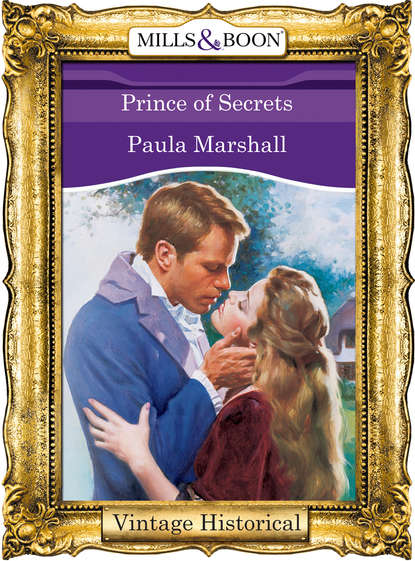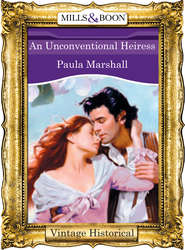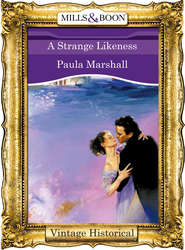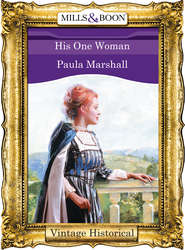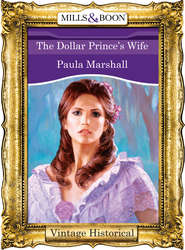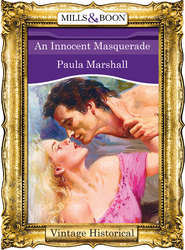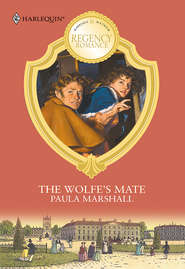По всем вопросам обращайтесь на: info@litportal.ru
(©) 2003-2024.
✖
Prince Of Secrets
Настройки чтения
Размер шрифта
Высота строк
Поля
‘On the other hand, let us discuss my wardrobe for Markendale,’ returned Dinah implacably, ‘and soon. Cobie has promised to drive me to the Park this afternoon, and it is almost time for me to go and change.’
She rose. ‘Perhaps you could write me a letter of advice about what to wear—that is, if you can find time to do so in the intervals of discussing the state of my marriage.’
Violet picked up her parasol, and said, ‘I’ll do that, my dear. I wonder if Apollo knows what a stalwart defender he has in you. He really doesn’t deserve you, you know.’
‘Not what you thought when he married me,’ Dinah muttered mutinously to herself: but she saw Violet to the door as pleasantly as though Violet had not exploded a bomb in her quiet drawing room.
She would say nothing to Cobie of this and would try to forget it. She had always found Susanna to be quiet and reserved, but pleasant: the notion that she and Cobie could be lovers made her feel a little sick. Nevertheless when they were out that night at a reception and Cobie and Susanna met and spoke to one another, rather distantly, she couldn’t help wondering if it were not all a game—like the one which Rainey played with Lord Brandon’s wife to try to persuade the world that they were not having an affaire.
There were times over the years when Susanna Winthrop bitterly regretted having rejected her foster-brother’s offer of marriage, made to her years earlier in a storm of passion. She had refused him because of the great difference in their ages, and had told herself that she would be able to live with that decision, be able to meet him and not feel the pangs of frustrated desire—after all, she was a rational person, wasn’t she?
Yet after his marriage to Dinah, when Cobie had refused to become her lover once she had discovered her husband’s true nature, and the evidence of his perversion, she had felt for Cobie something very like hate. She had taken up with Sir Ratcliffe because her foster-brother so plainly disliked him, just as she had married Arthur for the same reason. She could hardly bear to see Cobie and Dinah together.
Dinah’s patent happiness mocked her own misery, and although Sir Ratcliffe went warily with her, appearing to be both kind and gentle—bearing in mind who her foster-brother was—her heart remained where it had always been, with him, even if it were her hate she offered him, not her love.
On one of the last big events of the season, she met Dinah in the long corridor at the top of the stairs in Kenilworth House. It was soon after Violet had poured her poison into Dinah’s ear.
They bowed at one another. Some devil inside her, a devil which she did not know she possessed—or did it possess her?—made Susanna detain the girl she thought of as her rival.
‘We have not met lately,’ she said gently. It was true. Each, for their own different reasons, had been avoiding the other.
Madame’s training took over. Dinah said coolly, ‘We shall be meeting shortly, I understand, at Markendale.’
She was ready to move on, but Susanna prevented her.
‘It does not trouble you? That you will spend so much time with possible…rivals?’
What to say to that? She must mean Violet, or herself.
‘On the contrary…” and Dinah was still cool, though inwardly trembling, for she had never before realised how beautiful Susanna was, and that her as yet unacknowledged pregnancy had made her even more so ‘…I think that they have to worry about me, don’t you?’
She knew that Susanna disliked her, and saw at once that, by refusing to be ruffled, she had made an enemy. Susanna said, her voice a trifle shrill, ‘True, but he’s so attractive, isn’t he? Irresistible—as I still know, to my cost.’
Moved by the devil, Susanna had told Violet that Sir Ratcliffe’s child was Cobie’s. Sir Ratcliffe had laughed about the notion. He had, indeed, put the idea in her head. His own wife, that plain neglected woman, was present at this very reception.
She was wearing the last piece of jewellery left unsold to pay her husband’s debts, a diamond parure which had been a Heneage family heirloom for two hundred years. He was sure that she would never have the spirit to be jealous even if she learned that he was fathering a child on Susanna, but best to take no chances.
Susanna saw that her wicked dart had pierced Dinah’s heart. For a moment the true Susanna almost emerged, to say, ‘No, child, I’m lying, forgive me. Far from becoming my lover, he expressly refused—because of loyalty to you,’ but at that very moment she saw Cobie emerge from a door down the corridor. She also saw his face light up, not at the sight of her, but of his young wife—and virtue and pity fled from her together.
She said nothing to Dinah, but came out from the shadow which had been hiding her from her foster brother, and murmured sweetly, ‘So, there you are, Cobie. May I remind you that you are engaged to visit me tomorrow afternoon?’
The engagement was innocent enough. She had asked him round to pass on to him a letter from his mother in which she had enquired after him and his bride. A previous letter had gone astray.
Cobie’s answer, designed to be kind to Susanna, whom he profoundly pitied, and truly loved as a sister, was ‘No need ever to remind me, Susanna, I am always at your service,’ was so couched that it only served to add to Dinah’s misery.
She tried to forget, to persuade herself that Susanna’s words had borne an innocent meaning, but all that she could think of was how little she truly knew of her husband and his doings.
Unknown to her, or to anyone else, Cobie had gone to the Salvation Army home in Sea Coal Street which he was funding in his disguise as Mr Dilley, and there he had performed at a summer garden fête designed to raise money to help poor children.
He had paid for Mr Punch to visit the fête, and had staged his own small show of magic tricks to entertain the children but, however much they had enjoyed it, the shadow of Lizzie had been constantly before him, reminding him that her murderer still walked the earth, secure among the mighty…
But not, he hoped, for long. He had not seen Mr Beauchamp again, and he told himself savagely that whatever he did to Sir Ratcliffe would be done for Lizzie, and not for such dim creatures who avoided the daylight—whether he was truly his distant cousin, or no.
He was as relieved as Dinah when the time to visit Markendale arrived—if for quite different reasons. He thought that she looked tired, not knowing that the air of slight constraint which she wore had been put there by Violet’s wicked tongue and Susanna’s insinuations. However much she tried not to be affected by what they had said, the echoes of their conversation with her lingered on.
She had gone into his bedroom one day, when he was absent, engaged on she knew not what, drawn there by something which she couldn’t explain. The room was as tidy and beautiful as her husband always was. She had opened the wardrobe door, to see his suits hung there, row on row. She knew that two tallboys held his shirts and socks and she opened the drawers to inspect them. Never mind that Giles was responsible for this order, she knew what Rainey’s rooms looked like, and the confusion he lived in.
There was a desk in the corner at which she had often looked when she shared his great bed with him. That, too, was neat and orderly, as was the stand of books beside it. There was a large free-standing cupboard taking up one wall. Idly she tried to open it, knowing that she shouldn’t be doing this, shouldn’t be prying, but she couldn’t stop herself.
The door wouldn’t open. It was locked—and there was no key in the lock. The cupboard was like him, Dinah thought in sudden anguish. She didn’t possess the key to his lock—perhaps no one did. She gave the handle an impetuous, petulant jerk, and the door opened—the lock was old and had slipped.
Feeling like a villainess in a detective story, perhaps one by Mr Arthur Conan Doyle, Dinah looked inside. She couldn’t stop herself. The left-hand side of the cupboard was still locked; the right-hand side, with its deep shelves, stood open. She had no idea of what she had expected to find, certainly not what she did discover.
On the bottom shelf were packs of cards stacked neatly one above the other—some had been used, others had not. There were several light balls, all of different colours, and large silk handkerchiefs, the colours of which were garish: they were not at all the kind of thing Cobie would ever have used. When she timidly touched one of them, she found to her dismay that as she pulled at it gently, it was attached by one corner to another, and that was attached to yet another…and another… She tried to put them back exactly as she had found them, but it was difficult.
There were also some very light Indian clubs, painted blue and silver, which she had seen jugglers use, and a silk top hat—but again, not of the kind which her husband would ever wear; indeed, as she looked inside it, it seemed designed not to be worn. There were sticks with brightly coloured feathers on them… There were a number of wooden and metal hoops, and a small pile of paper hats.
The middle shelf held an assortment of strange boxes of different sizes and shapes—Dinah couldn’t imagine what their purpose was, even after she had examined them. One, in particular, was very beautiful.
On the top shelf was a brown bowler hat of the kind which she had seen artisans wearing when, out for the day, they wished to imitate the gentry. Beside it was neatly arranged—everything was neat, as he always was—a pile of mufflers, some of wool, some of silk, and all of them shabby. There were also a pair of carefully folded brown and yellow check woollen trousers, a short brown woollen jacket and a pair of heavy boots. Doubled up beside them was a large doll with brilliantly painted red cheeks and a wide grin. Its wooden head was on a peg which fitted into a cloth body.
Dinah felt like the lady in the story of Blubeard who had entered the forbidden room to discover strange and terrible things. There was nothing terrible about these things, but they were certainly strange. Memory teased her, until, suddenly, she knew that if she had not found the key to Cobie, she had certainly found the key to explain all these objects—they were the stock-in-trade of a stage magician.
She had sat in drawing rooms when she had been a little girl, oohing and aahing and clapping her hands while the visiting conjuror or magician performed his tricks with paraphernalia similar to that which was so neatly laid out before her. The big doll was undoubtedly a ventriloquist’s dummy.
What in the world was Cobie doing with them, hidden away as they were? She thought of him, grave, charming, always perfectly turned out, the complete patrician, remarkable for the excellence of his manners in a society where such things were highly valued. Nothing about him suggested that he would have a secret hoard of objects such as these—or be able to use them.
Why? She gave them one last stare before she shut the cupboard door and manoeuvred it so that it locked again, even though imperfectly. What else was he concealing? Who was the man who used these strange toys, for their appearance told her that they had been used, that this was no private museum. What else lay hidden behind the locked cupboard doors of his room?
And the odd clothing. What was that doing there? For the life of her she couldn’t visualise him wearing it. Then, when she shut the door of the room, a little frightened, as well as a little ashamed of having spied on him, memory struck.
Before they had married he had visited her in her dreams. Now that she was his wife, and shared at least a part of his life with him, he had ceased to do so. But the memory of that recurring dream, almost forgotten, came back to her—as well as the strange visions which she sometimes had during and after their love-making.
In the dream he had been quite unlike the civilised urbane man whom she and the world knew, the golden Apollo of the Prince of Wales’s set. He had been wild, feral, not even clean. His hair had been long, his face unshaven, and the hand he had extended to her had been grimy. She also remembered that he had never offered her his right hand in the dream, only his left. But he was right-handed, surely? Another puzzle.
What was important, though, was that she could imagine that man being a magician, a conjuror. That man could be anything. But why had she seen him in such a guise? Why, occasionally, during their love-making, when it was at its wildest—as it had lately become—had she had flashes in which she had seen the wild man again?
Could that man be carrying on a secret liaison with Susanna? She could imagine that man doing anything, anything at all. She would not like that man to know that she had been prowling curiously around his room, drawn there by the doubts that not only Violet had put in her head, but by his own conduct.
Not that, if questioned by a barrister, she could have said exactly what it was about him that disturbed her, but because she knew that she was beginning to sense that the inwardness of him was quite different from the bland image which he showed to English society.
She remembered what he had said to her before they were married. ‘Appearances often deceive, Dinah.’ All the way to Markendale, her mind worried at the problem which was Cobie Grant like a dog worrying a bone.
But she was the magician’s true pupil because nothing showed.
Chapter Three
A fter Sandringham and the season, living at Markendale was like falling into a warm bath. Nothing was required of one, Dinah decided, but to lie back and enjoy one’s self. That this also was not enough for her was a subject for internal annoyance. Really, what do I want? she asked herself. If I were honest, a different kind of life altogether, but that would mean being no longer Lady Dinah Grant—and do I want that? Could I bear to lose Cobie—even though in no true sense can I be said to have him!





